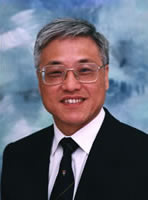HKU to Co-ordinate 3 of the 4 New Theme-based Research Scheme Projects
HKU researchers have achieved outstanding results in the 4th round of the Research Grants Council’s (RGC) Theme-based Research Scheme (TRS), which aims to focus academic research efforts on themes of strategic importance to the long-term development of Hong Kong.
In this latest round of the scheme, 4 successful projects were selected from 37 applications. HKU will participate in all 4 projects and is the co-ordinating institution of 3. The following 3 HKU-led projects—which look at influenza, the birth defect Hirschsprung Disease, and power delivery structures for renewable energy—received total funding of $184.54M for a period of 5 years, representing 90% of the allocation in this round.
Viral, Host and Environmental Determinants of Influenza Virus Transmission and Pathogenesis
|
Project Co-ordinator: Professor J.S.M. Peiris, School of Public Health
Approved funding: HK$75.06M
Influenza is a major threat to global public health. Pandemic influenza can spread worldwide within weeks. Being a travel-hub situated in a region of infectious disease emergence, Hong Kong is under particular threat. “Our project aims to identify the viral, host and environmental factors that determine the transmission of influenza viruses from animals-to-humans and from humans-to-humans. We will also investigate the pathogenesis of influenza and the immunological responses of humans to influenza infection,” Professor Peiris said. “Understanding these will help us develop evidence-based interventions to reduce transmission within the community and hospitals, provide better risk assessment of the human health threat from animal influenza viruses, and provide vaccine candidates as well as novel therapeutic strategies for the disease.”
|

|
|
The research team spans the animal-human-environmental interfaces and is composed of basic scientists in virology and molecular biology as well as community-based researchers, public health practitioners, clinicians, computational biologist and engineers. “The team, through a related Areas of Excellence project previously funded by the government, has contributed to public health locally and globally and has been recognised by international agencies such as the World Health Organisation and Food and Agriculture Organisation of the United Nations,” Professor Peiris explained. “We now build upon that success to deal with these big research questions of today that require a multi-disciplinary approach.”
“The Theme-based Research Scheme is the only local source of research funding for such large-scale multi-disciplinary projects,” Professor Peiris said. “We look forward to using the award to address these grand challenges of relevance to both local and global public health and to strengthen Hong Kong’s position in the knowledge-based economy of the 21st century.”
|
Genetics and Functional Genomics of Neural Crest Stem Cells and Associated Disease: Hirschsprung Disease
|
Project Co-ordinator: Professor P.K.H. Tam, Department of Surgery
Approved funding: HK$62.36M
Hirschsprung disease (HSCR) is a genetic disorder characterised by an absence of nerve cells in the colon, resulting in intestinal obstruction. It is a common birth defect and is particularly prevalent in Asia. Babies with HSCR will die if untreated. Currently the only available treatment by surgical resection of the abnormal bowel is inherently imperfect, which calls for better understanding of the disease for formulating novel treatments. “Our project targets the health and well-being of children,” Professor Tam said. “Curing birth defects confers health benefits for the entire life-span of patients.”
|

|
|
The major objectives of the project include discovering new genetic variants for HSCR to elucidate the regulatory landscape, identifying disease-associated gene variants, exploring gender differences in the manifestation of HSCR, and understanding the disease mechanisms and cell fate specification and differentiation. Professor Tam explained, “Understanding how the genetic makeup leads to clinical manifestations will allow genetic counselling, more accurate diagnosis and stratified patient care according to risk predictions. The findings will also provide an integrative model for research on other birth defects.”
With a solid foundation and unique research resources such as the world’s largest patient collection and patient-specific induced pluripotent stem cells, an extensive range of animal models, as well as international expertise in related fields, the multi-disciplinary team is confident in delivering the promise of a better cure with this round of funding. “I am excited, humbled and gratified about the awarded project, which is a team effort and I would like to thank my team members who are marvellous in every way, making the task both fruitful and enjoyable,” Professor Tam said. “I would like to dedicate the study to our young patients whose resilience in the face of suffering has inspired us to embark on this journey of inquiry in search of a better future for them.”
|
Sustainable Power Delivery Structures for High Renewables
|
Project Co-ordinator: Professor D.J. Hill, Department of Electrical and Electronic Engineering
Approved funding: HK$47.12M
Achieving a sustainable environment is a global endeavour and one way is to increase the use of renewable energy such as solar, wind and tidal power. “Electricity grids are more complex than other flow networks such as water and gas,” Professor Hill explained. “At higher levels of renewable power, not only do we need new technologies for energy harvesting and storage, but the current electricity delivery systems require major changes from households to national grids.”
|

|
|
“Our project addresses new developments in power control devices and system automation, including the necessary communications, to ensure the required quality in power supply for frequency, voltages and security is achieved despite the variable nature of renewable power. The key concepts underpinning the research plan are based on our prior work on electric spring smart load technology, power networks, distributed control and information networks.”
Professor Hill explained that while the project is closely linked to industry, which will give advice and provide support for the necessary testing, it will not be constrained by any current business model in the way that many other research studies in this area tend to be.
Drawing upon the strengths on basic and applied research of the multi-disciplinary team, this project seeks to create a significant impact on the development in Hong Kong and the broader China region. “Advanced societies like Hong Kong should show leadership and set good examples in sustainability,” Professor Hill said. “I believe this project provides an opportunity for Hong Kong to exert a positive influence on the issue with its excellent research.”
|
Success in other competitive funding schemes
In addition to the TRS, HKU has performed very well in other RGC competitive peer-reviewed research funding schemes. In the General Research Fund (GRF), HKU has been awarded both the greatest number of projects (240) and highest amount of funding ($165M, on-costs excluded) for the 12th consecutive year. HKU’s young researchers have also achieved success in the Early Career Scheme (ECS) by securing the largest share of total funding. In the Humanities and Social Sciences Prestigious Fellowship Scheme (HSSPFS), HKU has gained support for 3 of the 6 awarded projects, the highest number among the institutions.
Find out more







